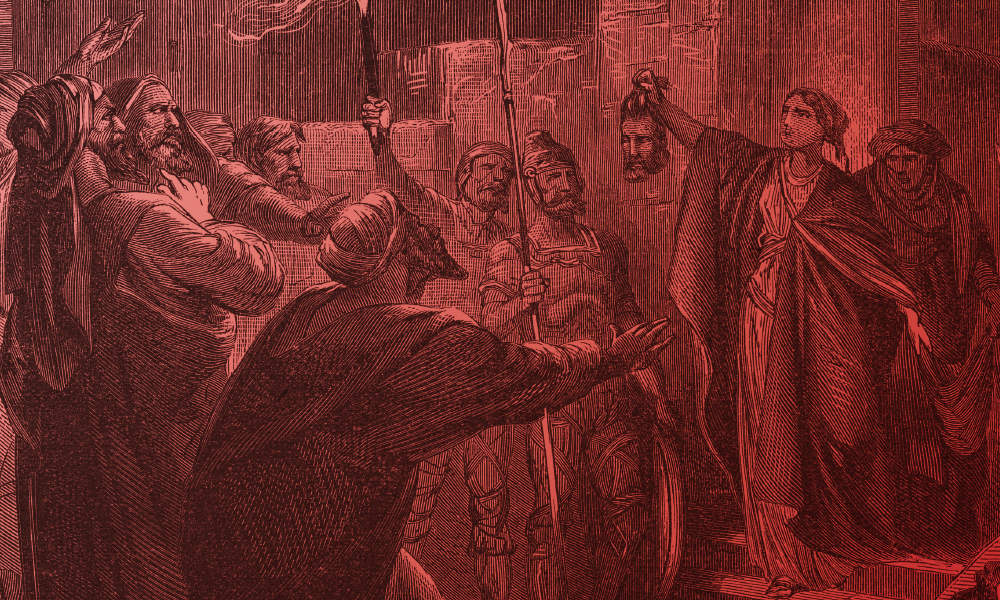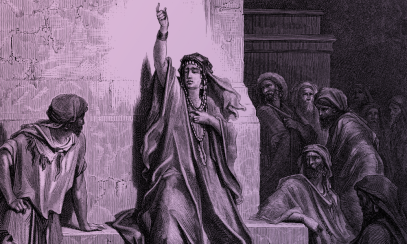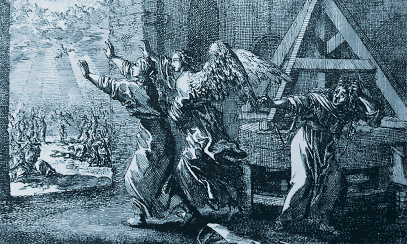
Judith
Wise and courageous
Wise and courageous
But the Lord Almighty thwarted them, by the hand of a female! Not by youths was their champion struck down, nor did Titans bring him low, nor did tall giants attack him; But Judith, the daughter of Merari, by the beauty of her face brought him down.” - Judith 16:5-6
But the Lord Almighty thwarted them, by the hand of a female! Not by youths was their champion struck down, nor did Titans bring him low, nor did tall giants attack him; But Judith, the daughter of Merari, by the beauty of her face brought him down.” - Judith 16:5-6
The passage at left is taken from Judith’s Hymn of Deliverance. It celebrates Israel’s defeat of the Assyrians, which was made possible because of Judith’s courageous action and subsequent wise battle plan. Her story is yet another example of God delivering the Jewish people from harm by using the least likely of people. It is also a reminder of the importance of doing all we can to pursue what is right while never putting God to the test. Judith’s witness encourages us to always remember the humble prayer of both Jesus and Mary: “Not my will, but your will be done.”
Judith’s story
The king of Assyria, Nebuchadnezzar, had sent his ranking general, Holofernes, on a military expedition against all of Palestine. After subduing several nations, Holofernes set his sights on Israel, who refused to worship the “quasi-divine” Assyrian king. His forces arrived at the Jewish city of Bethulia and laid siege.
Horrified at the thought of the Assyrians destroying the sanctuary at Bethulia, the Israelites prepared to defend the city against attack. However, the siege began to exact a great toll. When the city’s water supply was severed, the people began to press their leaders to surrender. Uzziah, who was one of the elders of the city, asked for five additional days. He said that if God did not deliver them in that time, he would surrender the city to the Assyrians.
It was at this critical moment that Judith appeared on the scene. Judith was a young widow who was known for her prudence and devotion to God. She had become angry when she heard of the calls to surrender and Uzziah’s response. She must have had significant standing in the community because the city’s elders, including Uzziah, came to her when summoned. She chastised them for putting God to the test. She said it amounted to them putting themselves in the place of God, a God whose plan they had shown they could never fathom. She went on to say that God was not moved by threats or cajoling.
Judith then proposed a different course of action, which she would undertake herself … without any elaboration, by the way. After gaining the elders’ approval, she did penance, dressed in her finest clothes and jewelry, left the city and journeyed to Holofernes’ camp. When confronted by his troops, she claimed to be fleeing the Jewish city and feigned support for Holofernes. Captivated by her beauty and intelligence, Holofernes invited her to a banquet. He hoped to seduce her. However, having drank too much, Holofernes passed out in his tent where Judith had been left alone with him. Judith then beheaded him and returned to Bethulia.
Upon her return, Judith proposed a plan of attack that involved displaying Holofernes’ head to the Assyrians. The Assyrians panicked at the sight and were routed. The siege was broken and the Assyrian camp was sacked by the Israelites. Triumphant, Judith lived the rest of her life in honor, reportedly dying at the age of 105. Although she had many offers to marry, she remained single and was buried alongside her husband.
A true story?
The Book of Judith is generally viewed as being based on historical fact. At the same time, it is also acknowledged that historical detail does not seem to be terribly important to the author. It seems to have been written primarily to communicate the central message that faithfulness to God alone saves Israel from danger.
What’s in a name?
Judith herself shares much in common with other significant women of the Old Testament. For example, like Jael, who drove a tent peg through the head of the general of the Canaanite army in the Book of Judges, Judith kills the head general of the Assyrian army. Judith “judges” Israel in a moment of military crisis just as Deborah had done. Judith’s beauty deceives foreigners in a way that benefits Israel in the same way that Sarah’s beauty helped preserve Abram (Abraham) from peril in Egypt (of course, Sarah would become the mother of Israel’s future). For these reasons, it is perhaps fitting that Judith’s name means “Jewish woman” in Hebrew.
Did you know…
We are introduced to Judith via her genealogy in Chapter 8 of the Book of Judith. Her genealogy is the longest given to a woman in the Bible. It stretches all the way back to Israel (or Jacob).
Now in those days Judith, daughter of Merari, son of Ox, son of Joseph, son of Oziel, son of Elkiah, son of Ananias, son of Gideon, son of Raphain, son of Ahitub, son of Elijah, son of Hilkiah, son of Eliab, son of Nathanael, son of Salamiel, son of Sarasadai, son of Simeon, son of Israel. -Judith 8:1
The Catholic view of the Book of Judith
Although the Book of Judith is not found in the Jewish or Protestant Scriptures, the Catholic Church includes it in its canon. In fact, the Catholic Church has always held the book in high esteem from its earliest days. In the first century, Pope St. Clement of Rome presents Judith as an example of courageous love. St. Jerome later saw her as a “type” of the Church and even describes Mary as a new Judith.
“[Judith’s] words pleased Holofernes and all his attendants. They marveled at her wisdom and exclaimed, ‘No other woman from one end of the earth to the other … speaks so wisely!’” - Judith 11:20-21
Doug Culp is the chancellor for the Catholic Diocese of Lexington.



